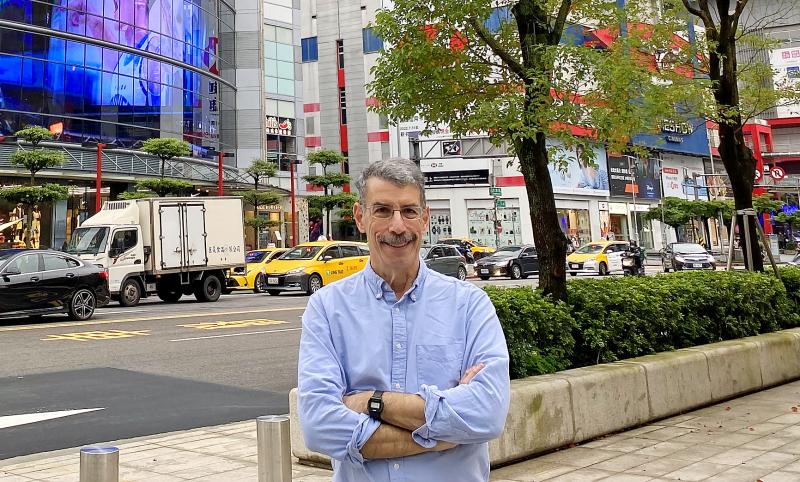Award-winning US journalist Mike Chinoy, who has covered the greater China region for decades, has received an employment Gold Card from the government, the National Immigration Agency (NIA) said yesterday.
Chinoy, who has received numerous awards for journalism, including the Emmy, Peabody, and Dupont awards, was issued the card for his expertise in culture and the arts, the NIA said in a press release.
The Gold Card is offered to highly skilled foreign professionals and technicians in a number of fields as part of Taiwan’s ongoing efforts to attract overseas talent.

Photo courtesy of the National Immigration Agency via CNA
Chinoy’s work has helped give Taiwan greater global exposure, the NIA said, citing his documentary The Thaw: Taiwan and China’s Changing Relationship in 2010.
The film series on cross-strait relations looks at economics-led rapprochement between Taiwan and China and has attracted attention online, the agency said.
Chinoy spent 24 years as a foreign correspondent for CNN, including eight years as the network’s first bureau chief in Beijing, bureau chief in Hong Kong and its senior Asia correspondent, according to the University of Southern California, where he is a nonresident senior fellow at the US-China Institute.
Chinoy has reported on the most important events in Asia since the mid-1970s, including the Tiananmen Square crisis, the Hong Kong handover, the Southeast Asian tsunami, elections and political crises in Taiwan and developments in North Korea, the university said.
He holds a bachelor’s degree from Yale University and a master’s from Columbia University.
The Gold Card is a combination of a work permit, residence visa and re-entry permit, which makes it easier for card holders to change jobs in Taiwan without being dependent on an employer for a work permit.

Taiwan is to have nine extended holidays next year, led by a nine-day Lunar New Year break, the Cabinet announced yesterday. The nine-day Lunar New Year holiday next year matches the length of this year’s holiday, which featured six extended holidays. The increase in extended holidays is due to the Act on the Implementation of Commemorative and Festival Holidays (紀念日及節日實施條例), which was passed early last month with support from the opposition Chinese Nationalist Party (KMT) and Taiwan People’s Party. Under the new act, the day before Lunar New Year’s Eve is also a national holiday, and Labor Day would no longer be limited

COMMITMENTS: The company had a relatively low renewable ratio at 56 percent and did not have any goal to achieve 100 percent renewable energy, the report said Pegatron Corp ranked the lowest among five major final assembly suppliers in progressing toward Apple Inc’s commitment to be 100 percent carbon neutral by 2030, a Greenpeace East Asia report said yesterday. While Apple has set the goal of using 100 percent renewable energy across its entire business, supply chain and product lifecycle by 2030, carbon emissions from electronics manufacturing are rising globally due to increased energy consumption, it said. Given that carbon emissions from its supply chain accounted for more than half of its total emissions last year, Greenpeace East Asia evaluated the green transition performance of Apple’s five largest final

Taiwan is to extend its visa-waiver program for Philippine passport holders for another year, starting on Aug. 1, Minister of Foreign Affairs Lin Chia-lung (林佳龍) said on Friday. Lin made the announcement during a reception in Taipei marking the 127th anniversary of Philippine independence and the 50th anniversary of the establishment of the Manila Economic and Cultural Office (MECO) in Taiwan, the Ministry of Foreign Affairs said. The decision reflected Taiwan’s commitment to deepening exchanges with the Philippines, the statement cited Lin as saying, adding that it was a key partner under the New Southbound Policy launched in 2016. Lin also expressed hope

Temperatures in New Taipei City’s Sindian District (新店) climbed past 37°C yesterday, as the Central Weather Administration (CWA) issued heat alerts for 16 municipalities, warning the public of intense heat expected across Taiwan. The hottest location in Taiwan was in Sindian, where the mercury reached 37.5°C at about 2pm, according to CWA data. Taipei’s Shilin District (士林) recorded a temperature of 37.4°C at noon, Taitung County’s Jinfeng Township (金峰) at 12:50 pm logged a temperature of 37.4°C and Miaoli County’s Toufen Township (頭份) reached 36.7°C at 11:40am, the CWA said. The weather agency yesterday issued a yellow level information notice for Taipei, New